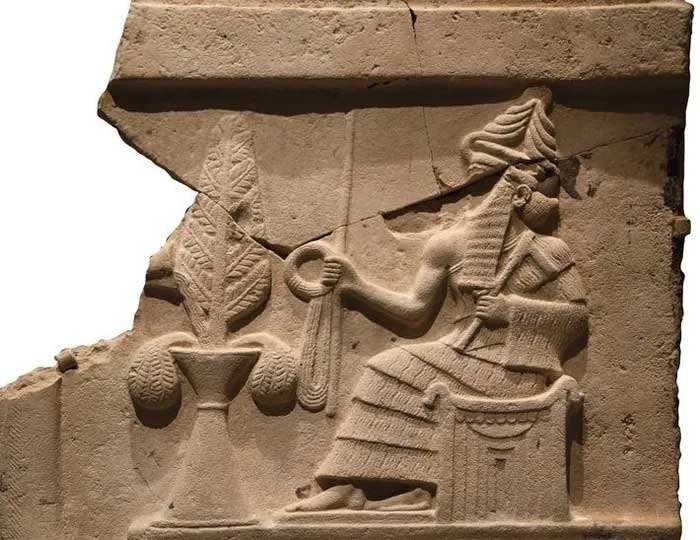The truth about the tax 'nightmare' of ancient people
Taxes have been around longer than we think. In ancient times, if there was no money, people would have to pay taxes in kind.
Every April, the United States begins to show signs of spring coming such as blooming flowers, chirping birds and tax payment notices.

Taxes appeared thousands of years ago and are applied in many different forms. (Photo: Bible History).
For many people, paying taxes is a fear, and this fear is not recent, but has been around for thousands of years.
For centuries, governments in many parts of the world taxed everything, even urine and facial hair. If people cannot pay taxes with money, they can use beer, beds and brooms instead. All taxes collected will be used to fund government projects and services, from building pyramids to raising armies.
Pay tax on 7 barrels of beer
According to National Geographic, taxes have existed since before coins existed . Taxes are applied to everything and can be paid with anything, not necessarily with money.

Taxes originated in ancient Mesopotamia. (Photo: Alamy Stock Photo).
In ancient Mesopotamia, the flexibility in paying taxes made this strange.
For example, the burial tax for a recently deceased person would include 7 barrels of beer, 420 loaves of bread, 2 bushels of barley, a sweater, a goat, and a bed.
Historian Tonia Sharlach in Oklahoma state (USA) said that around 2000-1800 BC, the tax payment record was 18,880 brooms and 6 logs.
Due to being forced to pay too heavy taxes, many people in ancient times found ways to circumvent the law. For example, one man said he had no assets except extremely heavy millstones. Therefore, the tax collector was forced to take these mortars away and had no other choice.
If you don't make money, you have to pay taxes
In ancient Egypt, this was one of the first civilizations to have an organized tax system. Around 3000 BC, shortly after Upper Egypt and Lower Egypt were unified by pharaoh Narmer, this tax system began to appear.
Researchers say Egypt's first rulers were very concerned about taxes. They traveled around the country with their entourage to assess people's assets - from oil, beer, ceramics to livestock and crops - and then tax it all.
At that time, the annual tax event was called Shemsu Hor, or Following of Horus.
During the Old Kingdom of Egypt, taxes were so high that they were enough to build large structures, such as the pyramids at Giza.
Ancient Egypt's tax system evolved over its 3,000-year history and became more complex over time.
During the New Kingdom of Egypt (circa 1539-1075 BC), rulers sought to tax people based on what they produced, before those products were sold.
To tax in this way, the rulers used an invention called the nilometer. This device is used to calculate the water level of the Nile River during the annual flood.
If the water level is low, less tax will be charged because it is a sign of drought and crop failure. On the contrary, if the water level rises, signaling a bumper harvest, people will have to pay more taxes.
Tax exemption if you have a good idea
The Mauryan Empire of India around 321-185 BC devised a way to give tax amnesty to the people. This is done through an annual competition and the winner gets a tax exemption.
Specifically, each year, the government will call on people to come up with ideas to solve the country's problems.
"If your solution is chosen and applied, you will be exempt from taxes for the rest of your life ," Greek writer and historian Megasthenes expressed surprise at this tax exemption in India.

Ancient Rome taxed urine because ammonia in urine brought many benefits. (Photo: Ancient Origins).
In ancient Rome, Emperor Vespasian was the one who brought stability to the empire in times of chaos, partly thanks to his very special tax innovation policy - collecting taxes with urine.
Ammonia was a valuable commodity in ancient Rome because it was effective in cleaning dirt and grease from clothes. In addition, urine is also used in making leather, making fertilizer and even whitening teeth.
All ammonia originates from human urine and the majority is collected from public toilets in Rome. Understanding that urine brings many benefits, Rome found a way to tax it.
However, not everyone supported Emperor Vespasian's urine tax method. The wealthy, including former Emperor Vespasian's son Titus, vehemently opposed the urine tax.
According to historian Suetonius, Titus told his father that he found the urine tax objectionable, and Vespasian said "Pecunia non olet", meaning "Money has no smell".
Many strange taxes
During its prosperity in the 15th and 16th centuries, the Aztec empire became rich through taxation. Historian Michael E. Smith studied the empire's tax collection system and found it to be more complex than many others.

The Matrícula de Tributos records the history of people's tax payment. (Photo: ResearchGate).
Taxes are collected by many different levels of government, in different forms, but are ultimately transferred to the central administration of the Aztecs.
Here, they kept meticulous records of people paying taxes and many records still exist today.
The most famous is the Matrícula de Tributos , a colorful record that records people's tax payment information.
This book is filled with red and blue hieroglyphs, showing how many leopard skins, how much corn, cocoa, and even gold, honey, salt, textiles.
Russia also has a very strange way of taxing. In 1698, Peter the Great required the country's men to be clean-shaven to resemble the modern nations of Western Europe - something he considered "modernization".
In order for people to comply with shaving regulations, he decided to tax those who liked to wear beards. Accordingly, Russian men who want to grow beards must pay a tax. Peasants paid a lower beard tax, and nobles and merchants could pay up to 100 rubles (about $1.07 today).
Those who have paid taxes are also required to bring a card to prove they have paid taxes. However, the beard tax regulation did not last too long. In 1772, Catherine the Great officially abolished this strange tax.
- Artificial intelligence causes nightmares for people
- Anti-snoring device
- 6 things we do not know about the people of ancient Egypt
- 5 discoveries of human nightmares
- Revealing the incredible truth few people know about ancient Egypt
- The horrifying facts about condoms in ancient times
- Does a true drug exist?
- The horrifying truth about the sacrifice of ancient people
- Mysterious truth to the incredible world of witches
- Discovered 8,000-year-old ancient gum
- The golden age of antibiotics is over, the immediate future will be a nightmare for humans
- 25 false scientific facts that we still believe in ancient times (1)
 'Fine laughs' - Scary and painful torture in ancient times
'Fine laughs' - Scary and painful torture in ancient times The sequence of numbers 142857 of the Egyptian pyramids is known as the strangest number in the world - Why?
The sequence of numbers 142857 of the Egyptian pyramids is known as the strangest number in the world - Why? History of the iron
History of the iron What is alum?
What is alum?